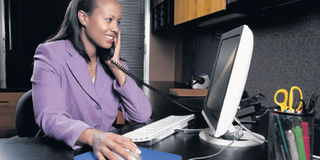Workaholic? Consider setting up home office

The size of your home office may vary depending on why you need it in the first place, but the key elements remain the same: A desk, a chair, and a computer. FILE | NATION
What you need to know:
- Most home offices are converted study rooms, but there are numerous other options available in your house. The key thing to consider is whether the place you decide to locate the office is quiet enough and well aerated.
If there is one thing that stresses the working class, it is having to carry home assignments that are due the following morning.
While some find having to carry home a workplace assignment interruptive to their social life and family time, it is the disruptive, sometimes noisy environment at home that antagonises many people.
“Home is a social setting and normally not ideal for office work that requires concentration without constant interruption,” says Benson Hinga, a freelance interior designer who previously worked for Urban Savannah Design Studio.
“You have children playing, others watching TV or doing other chores and you cannot demand to be given space to do what you should have done at the office,”
This is why, according to him, a home office is important. “It is an extension of the conventional office at the workplace, albeit on a smaller scale,” he explains. “That gives you a chance to create an environment you enjoy working in.”
Most home offices are converted study rooms, but there are numerous other options available in your house. The key thing to consider is whether the place you decide to locate the office is quiet enough and well aerated.
In this regard, then, offices fit the best next to a window in one of the corners in the house, in a bedroom, or even at the end of a hallway.
To set up one, you need the basic things that a conventional office would need — table, chair, and electronics. If your house is small, the cabinets and other furniture should be customised to fit what you have. You may have a monster office at the workplace, but that does not mean that you have to replicate it in your small abode.
The kind of job you do should also determine the kind of office you have as it is the tools of trade that will guide you on the amount of space you need, the layout, and the accessories. The basic things, however, remain the same: A computer, a desk, a printer, and chairs. “For the sake of safety, storage is paramount when designing a home office,” advises Hinga.
“In most cases, lockable cabinets are normally enough, but where someone is handling sensitive information, we recommend safes and hidden lockers.”




